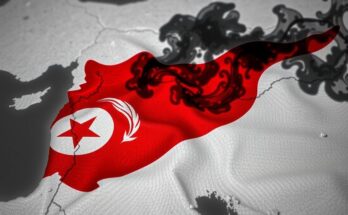Iranian President Masoud Pezeshkian issued a stern warning to Israel after a notable missile attack, characterizing the strike as a legitimate defense against aggression. He cautioned Israeli Prime Minister Netanyahu against escalating the conflict, while Supreme Leader Ali Khamenei suggested that the attacks would continue to intensify, emphasizing the precarious nature of regional tensions.
On October 1, 2024, Iranian President Masoud Pezeshkian issued a firm and uncompromising statement following Iran’s missile attack on Israel, which he characterized as a justified response to the aggression exhibited by the “Zionist regime.” Pezeshkian emphasized that the missile strikes were conducted in alignment with Iran’s “legitimate rights” and aimed at establishing peace and security in both Iran and the broader region. He asserted, “A decisive response was given,” underscoring the seriousness of Iran’s position. President Pezeshkian specifically cautioned Israeli Prime Minister Benjamin Netanyahu, stating, “Let Netanyahu know that Iran is not a belligerent, but it stands firmly against any threat. This is only a corner of our power. Do not enter into a conflict with Iran.” These remarks reflect Iran’s resolve to defend its national interests in the face of perceived threats. The missile barrage, comprising over 150 projectiles, was reportedly initiated due to Israel’s ongoing military engagements against Hezbollah in Lebanon, escalating the long-standing tensions between the two nations. During this period of heightened hostilities, Iran’s Supreme Leader, Ali Khamenei, also addressed the situation, suggesting that such attacks would likely increase, declaring, “With God’s help, the blows of the uprising front will become stronger and more painful on the worn and rotting body of the Zionist regime.” The widespread impact of the missile strikes was notable, with Israeli Defense Forces (IDF) confirming the attacks triggered nationwide alerts, forcing millions of citizens into emergency shelters. Significant explosions were reported in major cities including Jerusalem and Tel Aviv, leaving the threat of further escalation looming over the region as both nations prepare for potential retaliatory actions.
The backdrop of this conflict stems from longstanding tensions between Iran and Israel, primarily rooted in regional power dynamics and military engagements. Israel’s actions against Hezbollah, an Iranian-backed militant group operating in Lebanon, have heightened hostilities, leading to a retaliatory response from Iran which seeks to assert its influence and protect its national interests. The missile attack on Israel represents a significant escalation in this ongoing confrontation, with both sides demonstrating an intention to engage in further military action, thereby increasing the risk of broader conflict in the region.
In summary, the recent missile attack by Iran on Israel marks a significant increase in hostilities between the two nations. President Masoud Pezeshkian’s warnings to Israel highlight Iran’s resolve to respond decisively to threats, while Supreme Leader Ali Khamenei’s comments indicate a commitment to intensifying military actions against Israel. As both nations prepare for potential escalations, the stability of the region remains precarious and uncertain.
Original Source: indianexpress.com




